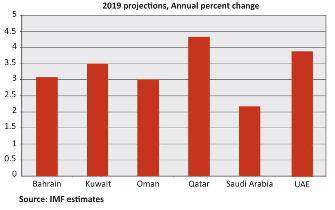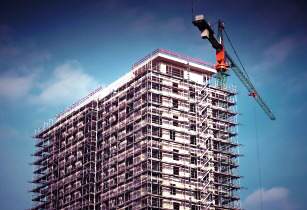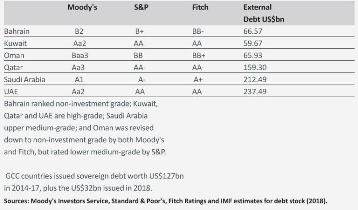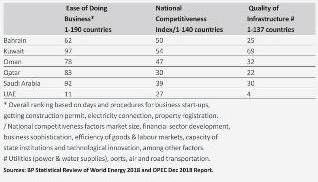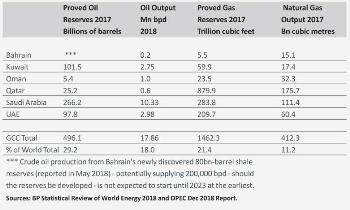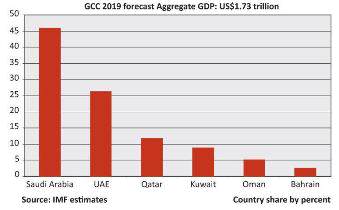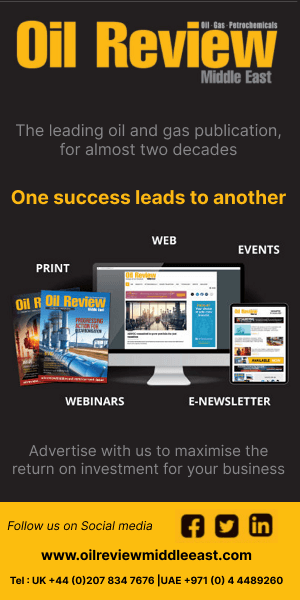Page 2 of 2Strategic development plans
The stimulus initiatives underpin GCC?s broader diversification strategy.
Factors such as demographic demand drivers and public/private funding combined with firm oil prices are catalysts for spend on capital/ infrastructure projects. The Arab Petroleum Investment Corporation (APICORP) envisages oil trading at US$60-70/barrel range by mid-2019. The ?long-term? vision agenda of each GCC country targets priority sectors such as logistics, tourism, energy, financial services, healthcare and manufacturing to deliver on economic diversification and job creation. About one million new jobs per year are needed in the GCC-bloc to absorb new entrants into the labour market over the next five years, according to the IMF.
The GCC still boasts some of the best project opportunities in the world. As home to the globe?s wealthiest countries, the financial muscle is available to develop/upgrade infrastructure and growth uptick in 2019-20 is conducive for project spending. ?There are huge opportunities in the region and it is a reassessment of how we plan for those [opportunities] and how we deliver them. We need to evaluate the return on investment for these assets,? said Deloitte Middle East. Though challenges have beset the market in recent years, with regional slowdown and weak oil prices affecting non-oil sectors and expansion.
Cross-country examples
As Saudi Arabia moves ahead with Vision 2030 based on greater private sector investments in non-oil ventures, local and foreign contractors can look forward to participating in mega-projects identified during last October?s Saudi Arabia Conference ? those will have huge ?multiplier-effects? both in Saudi Arabia and neighbouring countries. The kingdom is actively seeking to upgrade its transport-related infrastructure, as well as increase residential supply, healthcare and leisure facilities driven by the development of major schemes, notably The Red Sea Project, Neom, The Qiddiya Entertainment City and Maritime City. The value and quantum of building work to be awarded over the medium to long-term makes the kingdom a prime Middle East market with capital projects worth over US$1.2 trillion in pre-execution stages, according to Deloitte.
The UAE (led by Dubai) is laying the foundation for deepening a ?knowledge-driven? economy and is increasing competition, boosting energy efficiency and promoting technology entrepreneurship, aiming to attract diverse global investors and start-ups. Dubai has allocated US$7bn for new construction and upgrade related to hosting Expo 2020 Dubai, which will feature companies from 132 countries and is expected to boost private consumption and services. Abu Dhabi, the major oil-exporter, has unveiled a US$13.6bn stimulus package for infrastructure and is focusing on industrial and SME projects. Deloitte estimates the value of various UAE projects in pre-execution stages at US$713bn.
In Kuwait, plans to invest US$115bn in the oil sector over the next five years ? aimed at boosting output capacity by one-third to four million bpd by 2020 ? will also spur non-oil growth (via multiplier-effects). Kuwait?s flagship diversification venture, the Northern Gulf Gateway project with a new US$12bn airport, an industrial hub, tourism and education zones, plus a US$18bn railway system and building new residential cities (currently in pre-development stages) will increase both internal and intra-regional connectivity.
In Oman, the development of Special Economic Zones in Duqm and Sohar will drive project activity, together with planned investments in oil/gas sector while Bahrain is focusing on transport and housing areas. The Ministry of Transport owns two mega planned projects ? the airport expansion and light rail system (estimated worth US$18bn) and are anticipated to be awarded in late 2019.
Major project owners
Saudi Arabia?s Public Investment Fund (PIF) remains number one GCC project developer, with a portfolio estimated at US$534bn and its biggest under-development assets include the Neom City, Rou?a Al Madinah and Rou?a Al Haram. It is followed by King Abdullah City for Atomic and Renewable Energy?s nuclear power reactor (KA-CARE), worth some US$60-70bn and Saudi Aramco valued at US$36bn. PIF, Aramco, Saudi Electricity Company, Makkah & Medina Development Corp, and Saudi Railways Organisation are top project owners in the kingdom, owning around 70 per cent of the total amount of planned projects. PIF has taken a key role in delivering Vision 2030.
Dubai Aviation Engineering Projects ranks the fourth largest in GCC top-10 developers? list, with its most prized development being phase 2 of the Al Maktoum International Airport Expansion scheme, worth US$31bn ? spilt last year into various phases and packages. Kuwait Authority for Partnership Projects also makes the list of 10, with pre-execution projects worth US$31.5bn, followed by public authority for housing, with a total pre-execution pipeline worth US$29.3bn. The housing authority?s assets include the US$13.9bn Al Khiran City, and the US$13.5bn South Al Mutlaa City.
GCC member states are keen to develop and strengthen public-private partnerships (PPP) frameworks as a model for private sector involvement in project delivery with sound commercial returns, whilst lessening the burden on public finances. The current US$2.5 trillion transportation, logistics, energy (including renewables) and industrial as well as new cities? projects planned across the GCC-bloc offers huge opportunities for construction businesses and global investors in the coming years.
On current growth trend, the GCC?s aggregate GDP should exceed US$2 trillion mark by 2020. However, the likelihood of oil prices trading significantly below pre-2014 peaks of US$100 per barrel underscores the need for Gulf region to continue with structural reforms to diversify the economy, improve the business environment and boost productivity in non-oil sectors ? vital to job creation and FDI.
GCC sovereign credit ratings
GCC countries rank highest on global indicators
Data on GCC hydrocarbon reserves and production
Who generates lion?s share of regional output
Cross-country non-oil real GDP growth
